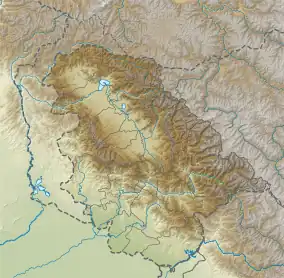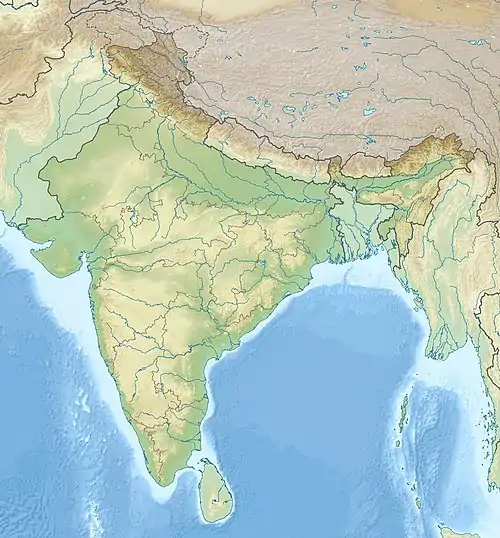Bumzuva Cave and Temple
Bumzuva cave and temple are a group of Hindu temples and artificial caves in the village of Bumazuv[1] in the Lidder Valley of Anantnag district in Jammu and Kashmir, India.
| Bumzuva Cave and Temple | |
|---|---|
 Bumzuva_Cave | |
| Religion | |
| Affiliation | Hinduism |
| District | Anantnag |
| Deity | Shiva |
| Location | |
| Location | Village of Bumazuv |
| State | Jammu and Kashmir |
| Country | India |
 Location in Jammu & Kashmir, India  Bumzuva Cave and Temple (India) | |
| Geographic coordinates | 33°46′19″N 75°12′47″E |
| Architecture | |
| Completed | 12th Century |
Description
Located a mile to the north of Bavan sacred springs, the cave is carved out of limestone cliff. Overlooking the beautiful Lidar valley carved out of large masses of limestone cliffs, the Bumzuva caves blanket the small village of Bumzuva, located only a mile north of the sacred springs of Bavan, the caves attract many for their delicate architectural work. Believed to have been built in the 12th century, the caves encompass a Shiva Temple, where lord Shiva is enshrined as Shivalinga. The Facade of the gateway to the temple is a work of stone masonry, consisting of a single trifold arched doorway, covered by side walls. The caves are full of floral scrolls of precise handiwork with rows of rosettes and figures of dancing dwarfs adorning the walls.
At the foot of the caves, are two temples which have been converted into Muslim Ziarats. The larger of the two is named as the Ziarat of Baba Bandin Sahib, a disciple of the famous Muslim saint of Kashmir, Shaikh Nuruddin. Overlapping stones cover the ceiling with a full bloomed lotus to his adorning the uppermost stone. Maintained by the Archaeological survey of India, the caves have been part of the rich heritage of both Hinduism & Islam, where the people of both religions have peacefully preached their faith.
One of the caves has a Shiva temple enshrined.[2] This temple has a trefoil arched doorway. The temple is believed to have been built in the twelfth century A.D. The length of the cave is approximately 5 by 10 meters.[3][4] It is maintained by the Archaeological Survey of India.[5]
References
- Village of Bumazuv (exterior, view of roadside shrine, 1983) MIT Libraries. Rita Sampat, Courtesy of the Aga Khan Visual Archive.
- Bumzuva Caves : A symbol of peaceful coexistence Radio Chinar
- "Bumzuva Cave Temple". Travel The Himalayas. Retrieved 2020-10-12.
- "Temples of Jammu & Kashmir (JK)". shaivam.org. Retrieved 2020-10-12.
- "Bumzuva Cave and Temple photos". Archeological Survey of India. Retrieved 2020-10-12.